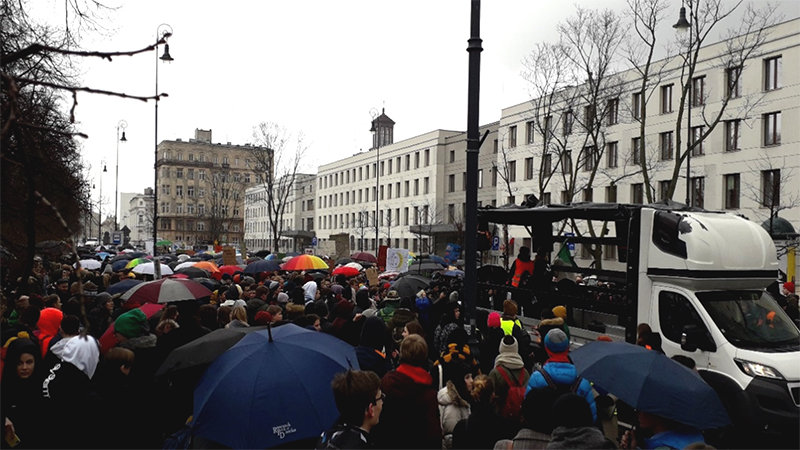Initial results of an international survey of the student strikes for the climate - UPDATE: Video clip and further information is available
The Professorship for Central and Eastern European Studies participated in an international survey of the #FridaysForFuture worldwide student protests.
(Update: 23 July 2019 - A video statement and current assessment of the state of the protests after the summer holidays has been added, under the "Multimedia" section. English subtitles are available)
The Fridays for Future movement marks a new phase in young peoples' involvement in civil society. The movement has contributed to a massive and unprecedented politicisation of young people, and in many cities around the world, brought Friday's lessons to a halt. What happens to the movement once the summer holidays are over?
"The summer holidays test the students' perseverance in the participation of these climate strikes, as there is no collective protest for an extended period of time. The data from our research suggests though, that further action will come within this Fridays for Future movement, after the summer holidays. Even though the young participants are by and large first-time protesters, there are two main points in favor of this conclusion: First, there is a great interest in the issue of the global climate and the advancement of sustainable environmental policy, and second, the young people show a great amount of hope that, through their participation in these protests, they can actually make a difference, and set both politics and society in motion. Beyond this, the persistence of movement initiator Greta Thunberg continues to command great attention from the media." (Dr. Piotr Kocyba, Research Fellow at the Professorship of Central and Eastern European Studies at Chemnitz University of Technology)
Multimedia: An assessment of the results by Dr. Piotr Kocyba (english subtitles available) is available as part of the "Statements From Research" series on the Chemnitz University of Technology YouTube channel.
Original article 24 June 2019
The #FridaysForFuture movement mobilised on 24 May 2019 for the second time as a part of an international Day of Action, a so-called ‘Climate Strike’. In the first instance, on 15 March 2019, a total of 1.6 million people worldwide took part in the student demonstration. During the first mobilisation, the Professorship of Central and Eastern European Studies at Chemnitz University of Technology, together with an international network of scientists, surveyed demonstrators in 13 cities in nine different countries. Overall, more than 10,000 protesters were approached, and nearly 2,000 surveys were completed. The Professorship for Central and Eastern European Studies was also involved in the survey of the second global mobilisation – and the team is now awaiting the results. Guided by the use of a research design that was based on the methodology of the large-scale project “Caught in the Act of Protest: Contextualising Contestation” (http://www.protestsurvey.eu), this survey makes it possible to make confident statements about those who support climate-friendly politics and have taken to the streets to show their support.
Young women are especially present at the demonstrations
“The results of the first survey, which are not a surprise, show that the demonstration mainly involved school students in the 14-19 year-old age group, even if the differences between the individual demonstrations were quite large. The median age for all samples is 21 years old, and this varies between 16 in Amsterdam and 40 in Brussels,” reports project manager Dr. Piotr Kocyba. More surprising than the young age of the demonstrators is the relative dominance of female participants. They made up 70 percent of protesters in Amsterdam, Florence, Warsaw and Vienna, for example. “Previous demonstration surveys show a more balanced relationship between the sexes, with feminist demonstrations attracting mostly women and right-wing demonstrations attracting predominantly men,” says Kocyba. The disproportionate amount of participation by women in the FFF demonstrations can be attributed to the strong presence of female leaders.
A new climate-protection movement seems to be establishing itself
Given the fact that they are relatively young, the scientists are not surprised by the fact that the demonstrators are often mobilising for the first time. On 15 March 2019, 38% of the demonstrating school students were taking part in a demonstration for the first time. The overwhelming majority of protesters are neither members nor financial supporters of an environmental organisation. Only 9.8% of the school students are either active or passive supporters of such an organisation. On the contrary, 35% of adult demonstrators are currently involved in an environmental organisation. The FFF movement, led by Greta Thunberg from Sweden, has been able to activate young people in civil society for the first time. 44.9% of the surveyed school students stated that Thunberg motivated them to participate in the demonstrations. “The significant number of young and often first-time activists seems to open up the possibility of establishing a new climate protection movement that goes beyond established actors and organisations to pursue its goals,” says Kocyba.
The Professorship of Central and Eastern European Studies at Chemnitz University of Technology was able to participate in the survey due to support from the Federal Ministry of Education and Research. The professorship was responsible for data collection in Warsaw and co-responsible in Budapest.
Report: Protest for a future: Composition, mobilization and motives of the participants in Fridays for Future climate protests on 15 March, 2019 in 13 European cities. Edited by Mattias Wahlström, Piotr Kocyba, Michiel De Vydt and Joost de Moor
For more information, please contact Dr. Piotr Kocyba, Phone +49 371 531-38521, E-mail piotr.kocyba@phil.tu-chemnitz.de.
(Author: Mario Steinebach / Translation: Jeffrey Karnitz)
Mario Steinebach
23.07.2019





